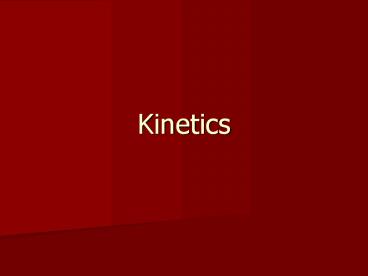Kinetics - PowerPoint PPT Presentation
1 / 9
Title:
Kinetics
Description:
Kinetics Collision Theory of Kinetics Kinetics is the study of the factors that effect the speed of a reaction and the mechanism by which a reaction proceeds. – PowerPoint PPT presentation
Number of Views:110
Avg rating:3.0/5.0
Title: Kinetics
1
Kinetics
2
Collision Theory of Kinetics
- Kinetics is the study of the factors that effect
the speed of a reaction and the mechanism by
which a reaction proceeds. - In order for a reaction to take place, the
reacting molecules must collide into each other. - Once molecules collide they may react together or
they may not, depending on two factors - - Whether the collision has enough energy to "break
the bonds holding reactant molecules together" - Whether the reacting molecules collide in the
proper orientation for new bonds to form.
3
Effective Collisions
- Collisions in which these two conditions are met
(and therefore the reaction occurs) are called
effective collisions. - The higher the frequency of effective collisions
the faster the reaction rate. - When two molecules have an effective collision, a
temporary, high energy (unstable) chemical
species is formed - called an activated complex - Not a true molecule because its bonds arent
complete
4
Activated Complex
- The difference in potential energy between the
reactant molecules and the activated complex is
called the activation energy, Ea - The larger the activation energy, the slower the
reaction - The energy to overcome the activation energy
comes from the kinetic energy of the collision
being converted into potential energy, or from
energy available in the environment, i.e. heat. - Different reactions have different activated
complexes and therefore different activation
energies
5
Factors Affecting Reaction Rate
- The kind of molecules and what condition the
reactants are in. - Small molecules tend to react faster than large
molecules - Gases tend to react faster than liquids which
react faster than solids - Powdered solids more reactive than blocks
- More surface area for contact with other
reactants - Certain types of chemicals are more reactive than
others - Ions react faster than molecules
- Increasing temperature always increases reaction
rate
6
Factors Affecting Reaction Rate
- The larger the concentration of reactant
molecules, the faster the reaction will go. - Increases the frequency of reactant molecule
contact - Concentration of gases depends on the partial
pressure of the gas - Higher pressure Higher concentration
- Concentration of solutions depends on the solute
to solution ratio (molarity).
7
Factors Affecting Reaction Rate
- Catalysts are substances that effect the speed of
a reaction without being consumed. - Most catalysts are used to speed up a reaction.
- Homogeneous present in same phase
- Heterogeneous present in different phase
- Molecule gets adsorbed onto catalyst active site
- Enzymes
- Catalysts work by providing a pathway for the
reaction with a lower activation energy
8
Molecular Interpretation of Factors Affecting
Rate
- Catalysts work by providing an alternative
pathway for the reaction with a lower activation
energy - Lowering the activation energy means more
molecules have enough kinetic energy so that when
they collide they can form the activated complex - The result is the reaction goes faster
9
Reaction Dynamics
- If the products of a reaction are removed from
the system as they are made, then a chemical
reaction will proceed until the limiting
reactants are used up. - However, if the products are allowed to
accumulate they will start reacting together to
form the original reactants - called the reverse
reaction.































